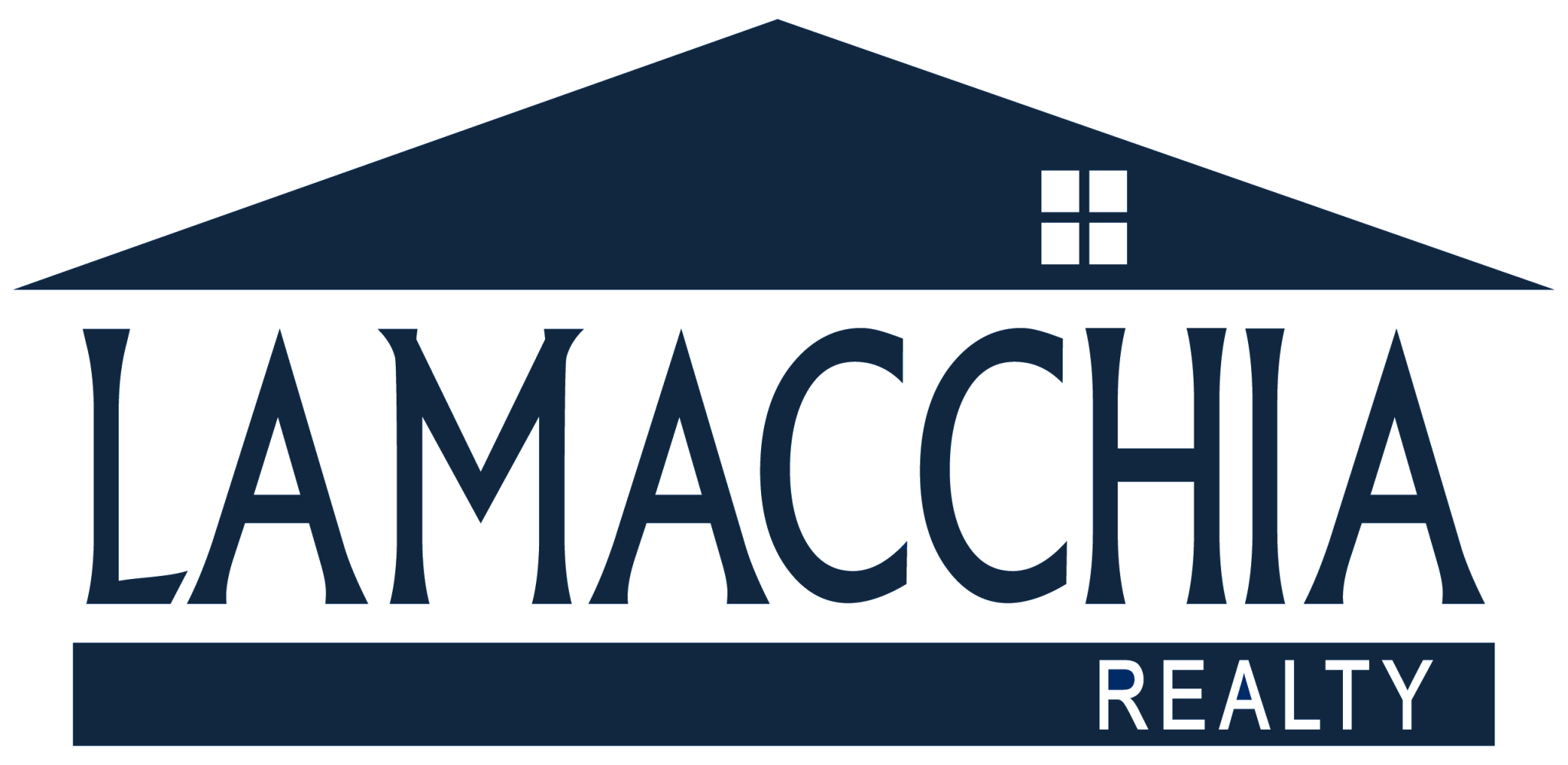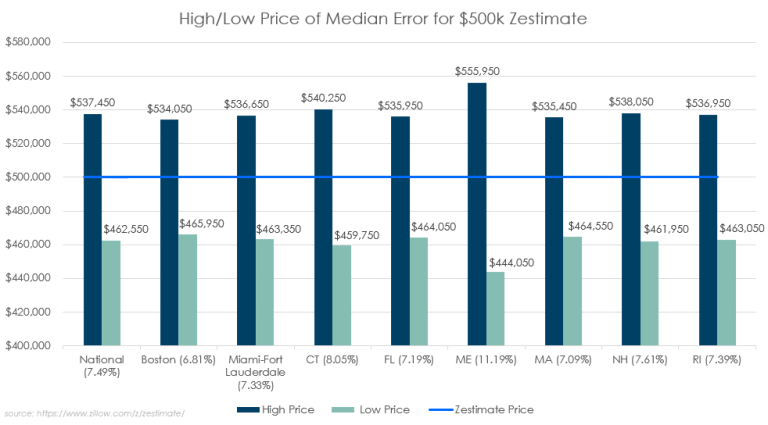
What exactly is a Zestimate?
Are Zestimate’s Worth Looking At?
A Zestimate is not a forward-thinking tool, Zestimate’s track the market instead of driving the market. There will always be a bit of a lag in price. Their information also depends on what is available to them. Meaning in some areas where there is an abundance of recent information on surrounding houses, the Zestimate is likely to be more accurate than in areas with little recent information. Zillow’s accuracy has a median error rate of 7.49%. An error rate refers to the frequency or proportion of errors in a set of data. Essentially, this means that half the time, Zillow’s home value estimates are within 7.49% of the actual value.
The graph below further exemplifies Zillow’s median error rate for a typical $500,000 Zestimate in various geographic locations. So, for example, if the Zestimate of a home is $500,000, using the national median error rate of 7.49%, that means your home could actually be worth $37,450 more or less than Zillow’s estimated value. In other words, your home’s value could be as much as $537,450 or as low as $462,550.
*Data for off-market listings as of November 8, 2022 provided by https://www.zillow.com/z/zestimate/
Additionally, this table shows the percentages of homes where the Zestimate was within 5, 10, or 20% of the transaction price in various geographic locations. To further explain, nationally, Zillow was able to provide Zestimates for 102 million homes given the data available. Out of those 102 million Zestimates, only about 36% of them were within 5% of the actual sales price. Using the $500,000 Zestimate example, that means your home could have sold for $525,000 on the high end or $475,000 on the low end. If anything, this exemplifies the degree of variance between a Zestimate and actual value of the home – one that a trained REALTOR® is most likely able to better evaluate!
*Data for off-market listings as of November 8, 2022 provided by https://www.zillow.com/z/zestimate/
A Zestimate CAN’T Replace a REALTOR®!
The bottom line is Zillow doesn’t know much about your house! The way a REALTOR® determines real estate market value totally different than how Zillow does. Zillow doesn’t have the ability to reason like a REALTOR® does.
In fact, in a CBS News interview with Former Zillow CEO Spencer Rascoff, he is asked about the accuracy of Zestimates. Rascoff replies, “It’s a starting point, but if you want to get a more accurate opinion of your home’s value, you should talk to a real estate agent or an appraiser.”
School Locations – Zillow doesn’t know that your home is in a better school district than the home that just sold down the street.
Town Data – Zillow doesn’t know that the public record for your home hasn’t been updated and that you now have three full bathrooms instead of two.
Home Repairs – Zillow doesn’t know that your roof needs to be replaced and the home beside you has a brand-new roof. It also doesn’t know that you just spent $10,000 on a new lawn care system as well as a home security system, and the recently sold property across the street didn’t.
Most real estate agents will tell you they dislike Zillow because it lacks credibility in their eyes. In a world where buyers and sellers are already skeptical of real estate agents, Zillow only makes things harder for them, therefore causing conflict and distrust. Real estate agents take time and dedication into determining the right list price or offer, and when it’s valued significantly over or under the Zestimate, buyers and sellers become hesitant of their agent because they think a giant like Zillow may have the upper hand on pricing. Alternatively, they are so big that they aren’t taking the details into consideration when calculating a price, they’re looking at too big of a picture for their Zestimate to be accurate or fully reliable which is why it’s far from a confirmed list price.
The overall accuracy of Zestimates has made recent headlines, specifically in 2021 when Zillow announced they were terminating their house-flipping program, Zillow Offer, after three years. This decision led to many buyers and sellers questioning the reliability of Zestimates. In Zillow’s official statement, they explain their reasoning for terminating the program:
“We have been able to convert only about 10% of the serious sellers who ask for a Zillow Offer, and have tended to disappoint the roughly 90% who didn’t sell to us.”
They then go on the explain that they believe there are “less risky” ways to engage with potential sellers and buyers. Zillow itself is even emphasizing that there is risk associated with using Zillow as a primary home evaluation tool.
Simply put, a Zestimate is JUST a starting point!
Zestimates are not a bad thing – they can certainly be good starting points for a closed comparable sale or a “comp”. Comps are used to approximate the market value of residential properties. In order to identify comparable sales, all physical attributes of a home such as location, style, size, age, condition, amenities, upgrades, number of bedrooms and bathrooms, and more must be taken into account. Additionally, it is important to consider the time of year the property went under contract or accepted an offer, which is the sole non-physical factor to be considered in markets impacted by seasonality.
Zillow is a great tool for buyers and sellers but it can’t be used exclusively to buy or sell a house. You won’t be able to get a mortgage based on a Zestimate, and an appraisal from a certified appraiser will be required by the mortgage lender to obtain financing unless you’re paying with cash.
Keep in mind that the number one reason why homes do not sell is because of an unrealistic asking price! Hire a real estate agent to help you price competitively!
In conclusion, don’t let the Zestimate rule your decisions! Talk to a professional REALTOR® to get an accurate home evaluation. Contact me when you’re ready to buy or sell a home!


